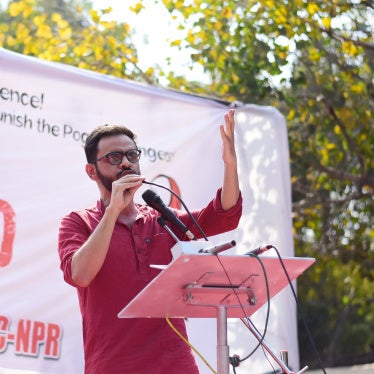Reports, news releases, and campaigns published by Human Rights Watch from 1989-2004 on the June 1989 massacre at Beijing’s Tiananmen Square.
Coverage of Tiananmen Arrests and Trials, 1989-1991
June 12, 1989: New Information on Arrests and Releases in China
June 15, 1989: New Information on Arrests and Releases in China
June 24, 1989: New Information on Arrests in China
January 2, 1990: Update on Arrests in China
January 27, 1991: Rough Justice in Beijing
February 27, 1991: The Beijing Trials
March 11, 1991: The Case of Wang Juntao
April 1, 1991: Update on Arrests in China
July 25, 1991: Guilt by Association
Perspectives on Tiananmen Square 10-Years Later: Human Rights Watch Interviews, May-June 1999
Tang Boqiao, Hunan Student Leader
Liu Binyan, Journalist
Zhang Weiguo, Shanghai Correspondent
Wang Juntao, Reformist Researcher
Chen Yizi, Chinese Communist Party Reformer
Wang Chaohua, Beijing Student Leader
Tiananmen, 15 Years On (2004)
Beginning on June 12, 1989, the Chinese government issued “wanted lists” of student leaders and others sought for their role in the protests. Human Rights Watch asked a sampling of people from the lists to discuss their involvement in the pro-democracy movement, the immediate aftermath of the crackdown, their lives subsequent to June 4, 1989, and their assessment of what Tiananmen meant for the future of China.
Reports
This report focuses on six countries around the world which illustrate the mechanisms of censorship through which governments formally and informally prevent reporting on the wealth of those in power. Corrupt regimes resort to censorship where their own self-enrichment is concerned because they realize that their very maintenance in office is at stake: widespread public anger over revelations of corruption has played a major role in uprisings such as China’s Tiananmen Square.
One year after President Clinton unconditionally renewed Most Favored Nation status for China and international pressure on China to improve its human rights practices dropped off dramatically, the Chinese government continues to impose tight controls on dissent and to engage in a pattern of systematic abuse of prisoners.
Wang Dan was sentenced to four years in prison as a leader of the Tiananmen Square protests. He was paroled in February 1993 but continued to speak out against the lack of redress for victims of the crackdown. With its decision to bring him to trial in October 1996 on the charge of “conspiracy to subvert the government,” the Chinese government has signaled its determination to deny freedom of speech and association to any citizen daring publicly to raise fundamental criticisms of government policy.
This report is a detailed analysis of the provisions of China’s new law relating to national security concerns, which broadened the state’s capacity to suppress dissent with the elastic notion of “endangering state security.” It assesses past use of the crime of “counterrevolution” and points out how changes in the law are affecting the state’s treatment of dissent.








